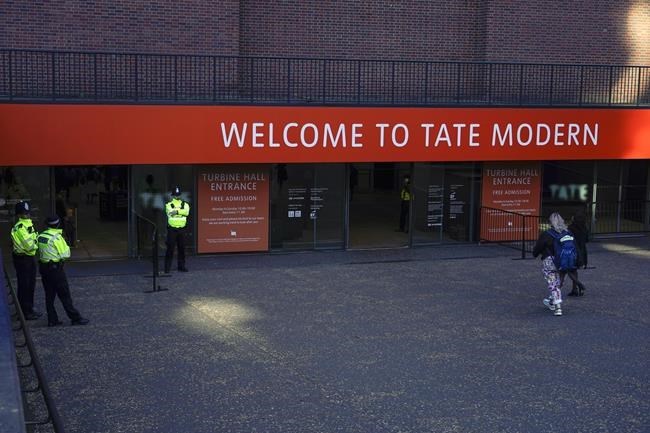
FILE - Police officers patrol the entrance of Tate Modern gallery, in London, Saturday, Oct. 15, 2022. The U.K. Supreme Court ruled on Wednesday, Feb. 1, 2023, that a viewing platform at London’s Tate Modern art gallery made residents of glass-walled luxury apartments next door feel like animals in a zoo, and impeded “the ordinary use and enjoyment” of their homes. (AP Photo/Alberto Pezzali, File)
Republished February 01, 2023 - 9:41 AM
Original Publication Date February 01, 2023 - 3:11 AM
LONDON (AP) — The U.K. Supreme Court says people who live in glass houses have a right to privacy too.
The court ruled Wednesday that a viewing platform at London’s Tate Modern art gallery made residents of glass-walled luxury apartments next door feel like animals in a zoo, and impeded “the ordinary use and enjoyment” of their homes.
The justices overturned earlier lower court rulings that sided with Tate Modern in the long-running privacy battle between the gallery — one of London’s biggest tourist attractions — and residents of four apartments in the neighboring Neo Bankside complex.
Justice George Leggatt said that the platform was visited by hundreds of thousands of people a year, who “frequently take photographs of the interiors of the flats and sometimes post them on social media."
“It is not difficult to imagine how oppressive living in such circumstances would feel for any ordinary person — much like being on display in a zoo,” he wrote in the court's majority ruling.
“It is beyond doubt that the viewing and photography which take place from the Tate’s building cause a substantial interference with the ordinary use and enjoyment of the claimants’ properties."
The court ruled that the gallery had violated “the common law of private nuisance.” Three judges backed the majority decision and two dissented.
Tate Modern opened in 2000 in a former power station on the south bank of the River Thames. It helped transform the surrounding Bankside neighborhood from a riverside backwater into an arts and nightlife hub dotted with luxury apartment towers.
The viewing terrace — which has been closed since the coronavirus pandemic —is part of a pyramid-shaped extension that opened in 2016 at the gallery, which sees more than 5 million visitors a year. Neo Bankside was completed a few years earlier.
Lawyers for the residents argued the 10th-floor platform, which attracted more than half a million gallery visitors a year, constituted a “relentless” invasion of residents’ privacy. They said gallery visitors subjected the apartments to “intense visual scrutiny,” with some using binoculars and zoom lenses to get a better look.
The gallery said residents could solve the problem by drawing their blinds or putting up curtains — and judges at the High Court and Court of Appeal agreed.
But the Supreme Court found that the viewing platform was an “abnormal” use of Tate Modern’s land, and the beleaguered residents had a point.
“The claimants cannot be obliged to live behind net curtains or with their blinds drawn all day every day to protect themselves from the consequences of intrusion caused by the abnormal use which the Tate makes of its land,” the judges said.
The ruling surprised many legal experts.
“Previous court decisions have suggested that if you happen to be overlooked by others, that is just bad luck and you don’t have a legal remedy,” said Richard Cressall, partner at law firm Gordons. “The Supreme Court has decided to put a cap on that.”
Claire Lamkin, a real estate lawyer at Kingsley Napley, said that although the judges “emphasized the rare circumstances” of the case, “it will no doubt precipitate a wave of copycat cases where people feel a property development near them is highly intrusive.”
The residents had asked for the gallery to shield their apartments from view, or to pay damages. The Supreme Court sent the case back to the High Court to decide on the appropriate remedy.
Natasha Rees, a lawyer for the five residents who launched the claim in 2018, said her clients “look forward to working with the Tate as valued neighbors to find a practical solution which protects all of their interests.”
Tate Modern said in a statement that “as the case is ongoing, we cannot comment further.”
News from © The Associated Press, 2023